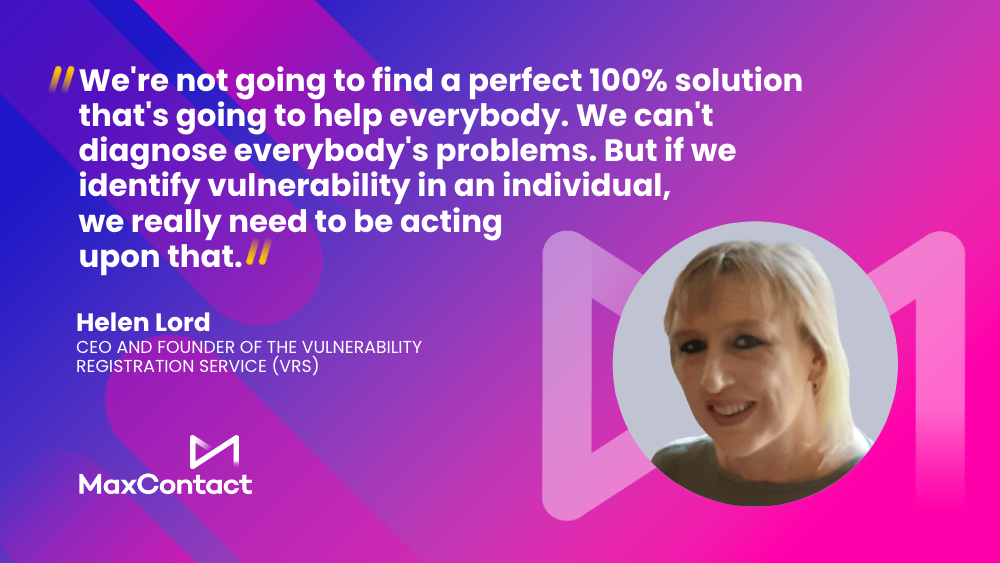How does your contact centre support potentially vulnerable customers?
As agents speak with countless people daily, while trying to meet targets and other responsibilities, sometimes it can be tough to give each customer the time and sensitivity they deserve.
However, there has been an increasing number of vulnerable adults, in part due to the cost-of-living crisis and the pandemic. MaxContact commissioned research on 1,000 customers who identified as vulnerable across the country to find out more about their needs and how contact centre staff could better support them.
In this webinar session, MaxContact’s Sean McIver speaks with Sandra Thompson, Goleman Emotional Intelligence coach in the UK and Founder of Ei Evolution, and Helen Lord, CEO and Founder of the Vulnerability Registration Service (VRS), to explore how contact centres can support vulnerable customers.
Keep reading for the top takeaways from our discussion or tune in to the full video.
Identifying vulnerable customers
How do we define a vulnerable person?
Unfortunately, there is no one single answer to this. Vulnerability comes in all different shapes and sizes. It could relate to financial vulnerability, recent job loss, age or disability-related issues, mental illness, or bereavement. Any of these things can affect how people make decisions and how much support they need.
When handling sensitive topics in calls, it’s so important that first line staff have some training in how to best respond to and support customers going through tough times.
As Helen explains, there’s greater recognition of the different aspects of vulnerability these days – especially following the pandemic and the cost-of-living crisis we currently face. People are generally more open about things like financial hardship and mental health, which is a positive step.
However, there’s still a long way to go in Helen’s opinion. There is currently a lot of talk and not enough action.
How businesses have responded to an increase in vulnerable customers
Sandra says that when leaders and staff have a better understanding of compassion and empathy, they can help to keep customers calm and resolve their problems more effectively. Part of that includes being proactive in giving out information so that customers feel like they have more control over their own situation.
Many organisations are realising this and are doing what they can to train their staff in this way. However, there are still plenty of organisations that don’t do this. As a result, contact centre staff often suffer from burnout, and customers are left feeling like the agents don’t understand them.
This leads to greater tension between the organisation and the customer, which means that issues take longer to resolve.
There are two stages of handling customer vulnerability. The first is to identify it, and the second is to think about how we can accommodate it in customer interactions.
As Helen says, dealing with vulnerability comes down to good customer service first and foremost.
Beyond that, organisations need to rethink how they map customer journeys because not all customers will experience things the same way.
For example, those experiencing mental health issues or people who are victims of economic abuse will have an entirely different experience. That’s why it’s important to consider all the different types of customer journeys.
While you may not be able to map out each individual one, understanding that everyone experiences things differently and taking things on a case-by-case basis will help agents support each customer individually.
The key to this is emotional intelligence. When agents have greater emotional intelligence, it makes them more empathetic and understanding of each customer’s journey. It also helps to keep agents themselves calm when dealing with emotionally difficult calls with customers.

Three things organisations can do to provide a better service
1 . Create content to support customers
Sandra says that if you have a good understanding of your customers and their needs, you should create content such as videos that help to build that emotional connection.
Videos with useful advice can help customers feel empowered to tackle their own challenges. This can also reduce the number of customer calls.
2 . Ensure you have the right statistics
This means, for example, having a way to see if a customer has called multiple times and keeps getting cut off. If people are discussing emotional issues on a call and they get cut off, it can increase mental stress.
Having that data keeps agents informed and ready to help customers right away.
3 . Try something counterintuitive
While many call centres have targets on call handling times, Sandra has a method that might seem a little counterintuitive.
Instead of trying to speed up the call, simply say “take your time.” When customers are stressed and are scrambling to remember a password, for example, saying “take your time” helps to keep them calm.
Once they’re calm, they’re more likely to remember a password, and you can resolve the issues much faster. While it might seem like this phrase would increase call time, you might find it does the opposite.
Protect contact centre staff
Dealing with difficult situations and emotions can take its toll on your agents as well. That’s why it’s so important to think about their wellbeing and mental health as well.
Helen suggests doing what you can to avoid a blame culture. By focusing so much on call times and targets, you just add more stress to the situation. Agents might feel rushed when dealing with sensitive issues, and this can affect customer service.
Another way you can protect contact centre staff is to ensure they have adequate training to deal with difficult calls. If agents don’t feel prepared, this can increase stress, and that affects the customer’s experience as well. Good training is a win-win for all.
Sandra shares some more ideas about how you can improve the training side of things.
1 . Don’t forget to check in on your remote staff
It’s important in today’s world to make sure you’re checking in on your remote staff. You can try out tools such as TeamMood, which staff can use to share feedback and let you know if they’re feeling low or stressed.
Remember, people won’t usually come to tell you this themselves, but a tool can prompt them.
2 . Check-in on team meetings
Before diving into your meeting agenda, have a quick check-in with everyone. Ask how they are and if they give vague answers, dig in further and ask more specific questions.
Sandra suggests, “what’s the top thing you feel amazing about?” Specific questions can help you understand your staff more easily and spot when something is wrong.
3 . Invite people to develop their understanding of emotional intelligence
Emotional intelligence is essential when handling difficult calls and emotional situations. Sandra suggests encouraging your agents to learn more about what it is and how you can improve it via online articles and videos.

Improve outgoing communication
Incoming communication from customer calls is one thing to think about, but we can also improve any outbound communications as well.
Sandra has three ideas you can try out:
1 . Prepare your customer for calls they’re due to receive
A quick email to let them know to expect a call over the next few days or a check-in can help to prepare customers. That way, they’re not suddenly dealing with a call and trying to figure out their account details. This can just increase stress, so a simple heads-up can go a long way.
2 . Make sure you’re tuned in to responses
Hearing and listening are two different things. When you make those outbound calls, are you really hearing the response the customer is giving? What words are they using? What behaviours are they showing when they receive calls?
3 . Empower agents
What degree of risk is there for agents who go above and beyond to help individual customers? Are agents empowered to resolve customer issues without passing them on to another member of staff?
By empowering agents to really help customers, they can feel good about their work and your customers will also get the care they need quickly.
By increasing openness and understanding – while improving staff training, contact centres can better support their customers.
To learn more about customer vulnerability and what call centres can do to improve their approach to it, tune in to the full webinar.





